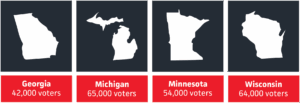At Data Trust, we are committed to delivering the most accurate, actionable, and resilient voter data in the industry. This year, our team rolled out a series of interconnected enhancements to our National Voter File, algorithmic partisanship model, and geocode accuracy. These updates, informed by your direct feedback, work together to reduce uncertainty, sharpen targeting, and future-proof our data against evolving privacy laws. Here’s an overview of what we’ve built, and the measurable impact already visible across key states.
Updated Schema: Cleaner & Richer
The Voter File schema was once again refreshed for the needs of the 2026 cycle. We added 33 high-value fields and retired 18 underutilized or obsolete one. The modernization focused on voter identification data enrichment:
- A Moved flag to identify where a voter existed in other prior-state records, or has been matched forward to a registration in a new state.
- Vote history and party registration carried over across state lines.
- Donor data was integrated by adding flags for Republican, Democratic, or bipartisan contributions (for analytical use only). This underlying donor match is available as a standalone dataset for ecosystem subscribers, enabling partners to leverage this signal independently.
- Last election voted, vote method, and days-to-election where available.
- Precinct-level election results, tagged to individuals.
- Ethnicity and education data was integrated at the census tract-level to get in front of tightening state privacy laws while maintaining analytical insights and activation.
CalcParty Upgrade: Donation History & Partisanship Insights
We’ve substantially upgraded our CalcParty modeled partisanship algorithm by incorporating those additions – political donor flags, improved intrastate new mover tracking, and cross-referenced intrastate partisanship and vote history data. This multi-signal approach delivers significantly sharper clarity on voter leanings in battleground states, such as:

Rooftop Geocode Project
We launched a nationwide initiative to upgrade our rooftop-level precision for every address across the country. With 50 of 51 states updated, many states saw dramatic improvement.
- Our national baseline jumped from 87% rooftop-level accuracy to over 98%.
- Some rural regions of states such as Louisiana and Oklahoma went from sub-50% rooftop-accuracy to over 95%.
In Summary
Each of these updates reinforces and amplifies the others, creating a compounding effect on data quality. The reconciliation of RegIDs restored vote history, producing better modeling inputs that feed back into partisanship calculations. The updated donor flags created a sharper CalcParty algorithm, which in turn reduced the number of Swing/Unallocated voters in our files. Census tract overlays created privacy-law resilience without sacrificing the granularity needed for sophisticated analysis. Updated rooftop geocodes allows for walk-list creation optimization. Together, these interconnected improvements have produced a Data Trust Voter File that is richer, cleaner, and more reliable as we move forward into the 2026 elections and beyond.